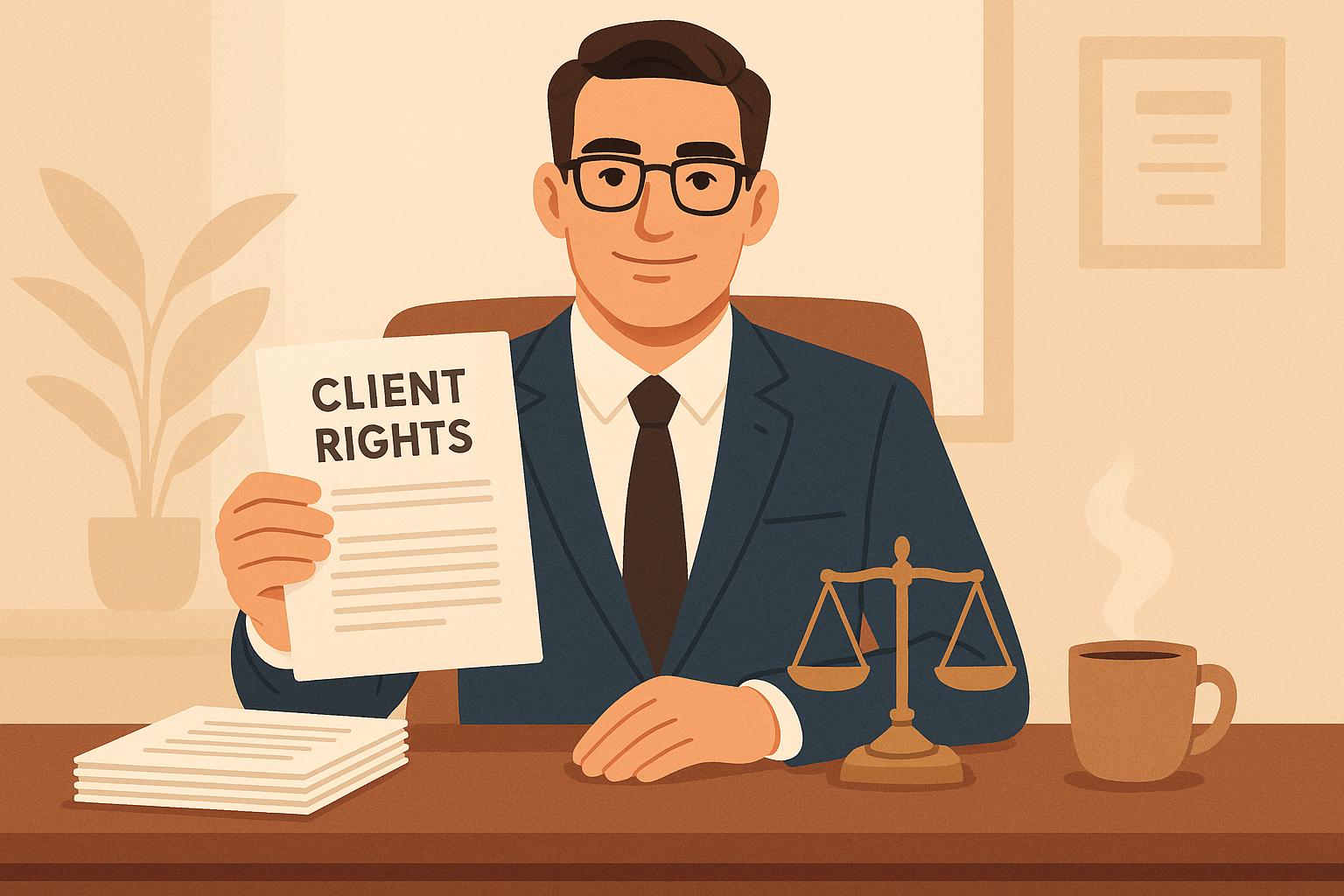You have specific rights in personal injury cases to ensure fair treatment and control over your legal journey. Here’s a quick summary of what you’re entitled to:
- Choose Your Attorney: You have the right to select legal representation that fits your needs and switch if necessary.
- Clear Communication: Expect regular updates, straightforward explanations, and access to your attorney through various channels.
- Confidentiality: Attorney-client privilege protects your discussions and case details.
- Settlement Control: Only you can accept or reject settlement offers.
- Full Compensation: Seek damages for medical expenses, lost income, pain, and suffering.
- Access to Case Files: Review all documents, evidence, and correspondence related to your case.
- Professional Service: Your attorney must follow ethical guidelines, provide competent representation, and communicate promptly.
- Decision Authority: You have the final say on major decisions, like filing lawsuits or settling.
- Complete Records: Access all case-related documents and ensure they are well-organized.
- Protection from Unapproved Actions: Your lawyer cannot make decisions without your explicit consent.
Key Tip: Stay informed, ask questions, and document everything to safeguard your rights and maximize your compensation.
1. Choosing Legal Representation
Selecting the right legal representation is crucial for your case. You have the right to choose an attorney who understands your situation and has the skills to handle your case effectively. Here are some key factors to keep in mind:
Experience and Expertise
Look for an attorney with a strong background in personal injury law. For example, at Ocala Injury Law, we offer an initial consultation to help you decide if we’re the right fit for your needs.
Communication Style
Your attorney should make you feel at ease and keep you informed. Pay attention to how they:
- Explain legal concepts in simple terms
- Provide regular updates on your case
- Respond promptly to your questions
Professional Credentials
Before making a decision, it’s important to:
- Review their case history
- Verify their membership with the state bar
- Ask for references, if necessary
If you feel your current attorney isn’t meeting your expectations, you can switch to another. However, make this decision carefully, as it could cause delays in your case.
The attorney you choose plays a major role in your case’s outcome, so take the time to evaluate your options thoroughly.
2. Clear Communication
In personal injury cases, clear communication is essential for making informed decisions about your legal representation. You have the right to straightforward explanations without confusing legal terms. Here’s how clear communication helps at every stage of your case:
Regular Case Updates
Your attorney should keep you informed about key aspects of your case, including:
- Case progress
- Important deadlines and court dates
- Settlement offers and ongoing negotiations
- Any required documents or actions on your part
Understanding Your Options
A good attorney will explain potential outcomes, realistic timelines (like how long your case might take), and financial details, including legal fees, settlement expectations, and insurance-related matters.
Communication Methods
Your attorney should be easy to reach through scheduled meetings, phone calls, emails, secure messaging, or even emergency contact options.
You deserve timely, clear answers to your questions. Remember, communication is a two-way street – ask questions and share any concerns while your attorney keeps you updated.
3. Private Attorney-Client Communications
Attorney-client privilege is a key legal right in personal injury cases. It ensures that anything you discuss with your attorney stays confidential, allowing you to share details openly without worrying about them being disclosed.
What’s Covered?
This privilege applies to all forms of communication, including:
- In-person meetings
- Phone calls and voicemails
- Emails and text messages
- Written correspondence
- Case-related documents you provide
- Video conferences or virtual meetings
How Far Does the Protection Go?
Confidentiality isn’t limited to just your attorney – it also extends to their staff, such as paralegals and legal assistants involved in your case. It remains intact regardless of the outcome of your case or if you switch attorneys later.
Exceptions to the Rule
Although attorney-client privilege is strong, there are specific scenarios where it doesn’t apply:
- If the communication involves plans for future crimes
- If third parties are present during discussions
- If the information is already public
- If the communication is tied to fraudulent activities
Keeping Your Information Private
To make sure your communications stay confidential:
- Avoid discussing legal advice in public or with others
- Use secure methods to communicate with your attorney
- Choose private spaces for sensitive conversations
These steps help preserve the confidentiality critical to your case.
Staying Safe with Digital Communication
When sharing information electronically, take precautions:
- Use your attorney’s secure client portal
- Avoid using public Wi-Fi networks
- Don’t forward privileged emails to others
- Protect sensitive documents with passwords
These practices ensure your attorney gets accurate and complete information while keeping your case secure.
4. Control Over Settlement Decisions
When it comes to settlement decisions, you hold the reins. While your attorney acts as an advisor and negotiator, the ultimate choice to accept or reject any settlement offer is entirely yours.
Your Settlement Rights
Here’s what you’re entitled to during the settlement process:
- The right to carefully review all settlement offers
- The right to ask questions and get clear explanations
- The right to turn down any offer you believe falls short
- The right to pursue litigation if negotiations don’t lead to a satisfactory outcome
Your Attorney’s Role
Your attorney’s job is to provide guidance and handle negotiations. However, they cannot finalize any settlement without your clear and explicit approval.
Key Factors to Consider
Before making your decision, take a close look at:
- The total compensation being offered
- Any deductions, like medical bills or legal fees
- Your net compensation after deductions
- Conditions or terms tied to the settlement
- How accepting the settlement could impact potential future claims
This level of control ensures you’re actively involved in the financial resolution of your case.
5. Full Compensation Claims
If you’ve suffered an injury, you can seek compensation for all related damages, including current costs and future expenses. Here’s a breakdown of the main categories you can claim.
Types of Compensation You Can Claim
-
Medical Expenses
These include costs for immediate treatments and ongoing care, such as:- Current medical bills and procedures
- Future surgeries or treatments
- Rehabilitation and therapy
- Prescription medications
- Necessary medical equipment
- Long-term care services
-
Lost Income and Earning Potential
Injuries can impact your ability to work now and in the future. You may claim:- Lost wages and future income
- Missed benefits or bonuses
- Costs of job retraining
- Reduced career growth opportunities
- Decreased earning capacity
-
Pain and Suffering
Compensation isn’t just about financial losses. You can also claim for:- Physical discomfort and pain
- Emotional and psychological distress
- Loss of enjoyment in daily activities
- Strained personal relationships
Accounting for Future Damages
Claims should reflect both your current losses and anticipated future needs. Here’s a quick overview of potential future damages:
| Type of Damage | Examples of Coverage |
|---|---|
| Medical Care | Future surgeries, ongoing therapy, treatments |
| Income Loss | Career setbacks, reduced earning ability |
This approach ensures your claim addresses both immediate costs and long-term financial impacts.
6. Case File Access
Your case file contains important documents that keep you informed and help you make better legal decisions. Having access to this file ensures you stay updated and involved in your case.
Key Documents in Your Case File
Here are the main types of documents you’ll typically find in a case file:
| Document Type | Contents | Purpose |
|---|---|---|
| Medical Records | Treatment history, diagnoses, prognoses | Shows the severity of injuries and costs |
| Financial Documents | Bills, receipts, wage statements | Tracks financial losses |
| Correspondence | Letters, emails with insurance companies | Details negotiation history |
| Evidence Materials | Photos, witness statements, police reports | Supports claims of liability |
| Legal Documents | Court filings, settlement offers | Tracks the case’s legal progress |
How to Access Your Case File
You can review your case file through these methods:
- In-person: Visit your attorney’s office to review the file.
- Digital access: Use a secure client portal for online access.
- Printed copies: Request hard copies for your records.
Things to Keep in Mind
When managing your case file:
- Protect sensitive information to maintain confidentiality.
- Keep your documents organized in chronological order.
- Ask your attorney for updates on new documents.
- Write down any questions for your attorney to address.
At Ocala Injury Law, we provide secure digital and physical access to your case documents. Our client portal ensures you can view your file anytime, giving you the tools to make informed decisions. This aligns with our commitment to clear communication and empowering you throughout the legal process.
sbb-itb-68ed374
7. Professional Legal Service
When you’re involved in a personal injury case, you deserve a legal team that puts your needs first and adheres to strict ethical guidelines.
Core Professional Standards
| Professional Standard | What It Means for You | Why It Matters |
|---|---|---|
| Ethical Conduct | Follows state bar rules and ethical guidelines | Ensures your case is handled properly |
| Competent Representation | Skilled and knowledgeable legal support | Leads to effective case handling |
| Timely Communication | Keeps you updated regularly | Keeps you informed and engaged |
| Conflict-Free Service | No conflicting interests in your case | Ensures loyalty to your best interests |
Your Rights to Professional Service
Based on these standards, you have the right to expect:
- Attorneys who stay informed about legal updates
- Honest case evaluations and well-maintained records
- Prompt responses to your questions
- Compliance with court rules and deadlines
- Professional liability insurance for added protection
Professional Standards in Action
At Ocala Injury Law, these principles are more than just guidelines – they’re a promise. Their philosophy, "Practicing with Integrity", reflects their dedication to ethical and focused representation for every client.
Ensuring Accountability
Your attorney should take steps to uphold quality service, such as:
- Scheduling regular updates on your case
- Documenting key decisions clearly
- Explaining legal strategies in plain terms
- Providing transparent billing
- Safeguarding confidential information
- Training and supervising their staff effectively
These measures ensure you receive reliable and trustworthy legal support throughout your case.
8. Decision-Making Authority
In your personal injury case, you have the final say on all major decisions. Nothing significant happens without your explicit consent. This approach ensures that every step, from legal strategy to treatment choices, aligns with your preferences and priorities.
Key Decisions Requiring Your Approval
| Decision Type | Examples | Your Role |
|---|---|---|
| Legal Strategy | Filing lawsuits, alternative resolutions | Approve major strategic moves |
| Medical Treatment | Selecting providers, treatment plans | Maintain control over your medical choices |
| Case Resolution | Settling or going to trial | Decide how and when to resolve your case |
These areas highlight your active involvement in shaping the direction of your case.
How Informed Decisions Are Made
Your attorney ensures you stay informed at every step. Here’s what you can expect:
- Clear explanations of all available options
- Detailed discussion of risks and possible outcomes
- Professional advice tailored to your situation
- Written documentation of your decisions
- Adequate time to weigh your choices
- Full respect for your final decision
At Ocala Injury Law, strategy sessions are scheduled to provide you with the information and clarity you need to make confident, informed decisions.
Your Rights in the Decision-Making Process
Certain actions require your explicit approval, including:
- Starting or ending legal proceedings
- Agreeing to mediation or arbitration
- Signing legal documents
- Providing statements to insurance companies
Your attorney acts as your advisor and advocate but cannot:
- Make decisions without your consent
- Pressure you into settlements
- Withhold critical information
- Ignore your wishes or alter terms without approval
This process ensures that your voice is at the center of every decision in your case.
9. Complete Case Records
Your right to thorough case documentation ensures that every aspect of your claim is preserved and accounted for. This detailed recordkeeping forms the basis for all decisions related to your case.
Key Case Documentation
| Document Type | Access Rights for Clients |
|---|---|
| Medical Records | Full access with a written request |
| Communication Logs | Copies available upon request |
| Financial Records | Regular updates and copies provided |
| Legal Filings | Access to all filed documents |
| Evidence Materials | Review rights with your attorney |
Ensuring Document Security
Using secure and well-organized digital systems can help manage case records efficiently. These systems should:
- Track changes and updates to documents
- Keep detailed logs of all communications
- Safeguard evidence in a secure location
- Provide quick and easy access to information
- Maintain confidentiality at all times
Your Rights to Documentation
As a client, you are entitled to:
- Regular updates on your case files
- Copies of all relevant documents
- Secure online access to your case materials
- Proper organization and maintenance of your records
- Complete copies of your case file once the matter is resolved
Staying Organized
To support your case effectively, it’s important that all records are systematically organized. Keeping documents in chronological order and ensuring they are complete will provide clarity and strengthen your claim.
10. Protection From Unapproved Actions
When managing your case, it’s crucial to ensure no major steps are taken without your explicit consent. Your attorney is there to guide and advise, but they cannot act on significant matters without your approval. This section explains how to maintain control over your case and safeguard against unapproved actions.
Key Decisions That Require Your Approval
| Decision Type | Examples | Client Approval Needed |
|---|---|---|
| Settlement Offers | Accepting or rejecting settlement proposals | Written consent required |
| Legal Strategy | Filing additional claims or dropping charges | Detailed consultation required |
| Financial Decisions | Approving new case expenses | Explicit authorization needed |
| Court Actions | Filing appeals or dismissing claims | Written approval necessary |
| Expert Witnesses | Hiring specialists or consultants | Consultation and agreement required |
Steps to Protect Your Decision-Making Power
To make sure your rights and authority are upheld during the case, follow these steps:
- Keep Records: Always document approvals or denials in writing.
- Ask for Clarity: Request clear explanations of potential outcomes for every decision.
- Take Your Time: Review proposals thoroughly before giving consent.
- Speak Up: Ask questions about anything you don’t fully understand.
Clear Communication Is Key
Your attorney should provide consistent and transparent communication, including:
- Advance notice of decisions that require your input
- Written documentation outlining your options
- Detailed explanations of potential consequences
- Records of every decision you make
Safeguards for Your Authority
To ensure your authority is respected, your attorney should:
- Obtain written consent for all major decisions
- Offer clear, easy-to-understand explanations for proposed actions
- Keep comprehensive records of all decisions
- Respect your right to decline any suggestions
- Confirm your choices in writing
While your attorney offers expertise and guidance, YOU have the final say on important decisions. At Ocala Injury Law, we prioritize keeping you in control of your case. Every decision reflects your goals, ensuring that your interests remain at the forefront of the process.
Rights and Responsibilities Overview
Here’s a breakdown of your rights, the advantages they offer, and the steps you need to take to uphold them.
| Right | Advantages | Your Role |
|---|---|---|
| Legal Representation Choice | Freedom to choose an attorney that suits your needs | Research options, share accurate case details, and clearly outline your expectations |
| Clear Communication | Stay informed with regular updates and clear explanations | Respond promptly, ask questions, and keep your contact information current |
| Confidential Communications | Ensures private discussions and case details stay protected | Avoid sharing case details publicly, especially on social media, and direct inquiries to your attorney |
| Settlement Control | You have the final say on settlement offers | Carefully review offers, consider your attorney’s advice, and make timely decisions |
| Full Compensation Claims | Opportunity to seek all damages you’re entitled to | Keep track of expenses, document injuries, and attend medical appointments |
| Case File Access | Full visibility into your case documentation | Organize your records, request copies, and review them thoroughly |
| Professional Service | Receive expert legal guidance | Attend scheduled meetings and follow your attorney’s advice |
| Decision Authority | You’re in charge of major decisions regarding your case | Make informed choices and keep a record of all decisions |
| Complete Records | Access to all important documents | Save copies, report any missing files, and keep receipts |
| Protection from Unauthorized Actions | Control over decisions impacting your case | Review everything before signing and confirm decisions in writing |
Maximizing Your Rights
To stay on top of your case:
- Create a dedicated folder for all case-related documents.
- Keep track of important deadlines and appointments.
- Log all communications with your attorney or others involved.
- Write down any questions or concerns as they come up.
Summary
Exercising your rights ensures you receive fair compensation and proper legal support. These rights, explained earlier, give you control over important decisions throughout the legal process.
At Ocala Injury Law, attorney Alida "Ali" Catherine Darias, Esq prioritizes keeping clients informed and involved every step of the way.
Here are a few tips to help you stay on top of your case:
- Keep Detailed Records: Document all medical visits, expenses, and any case-related communications.
- Stay Informed: Regularly check on your case progress and don’t hesitate to ask questions.
- Protect Your Privacy: Share case details only with your attorney to safeguard your position.
- Act Quickly: Respond promptly to information requests and attend all scheduled appointments.
Following these steps helps you stay in charge throughout your legal journey.
FAQs
What should I keep in mind if I’m thinking about changing my attorney during a personal injury case?
Switching attorneys during a personal injury case is a significant decision, and there are a few key factors to consider. First, assess whether your current attorney is meeting your expectations in communication, transparency, and advocacy. If you feel unheard or your case is not receiving the attention it deserves, it may be time to explore other options.
Before making the switch, review your agreement with your current attorney to understand any potential financial or procedural implications, such as fees for work already completed. It’s also important to ensure that your new attorney has the experience and expertise to handle your case effectively. Firms like Ocala Injury Law focus on personalized legal support, ensuring clients receive the care and justice they deserve. Always prioritize your comfort and confidence in your legal representation to achieve the best possible outcome for your case.
How can I make sure my conversations with my attorney stay private and secure?
To ensure your communications with your attorney remain confidential and secure, always use trusted methods of communication. Speak in person or over the phone when possible, and avoid discussing sensitive details through unsecured channels like social media or public Wi-Fi. Attorney-client privilege protects your conversations, but it’s still important to take precautions to safeguard your information.
If you’re emailing or sharing documents, use secure platforms recommended by your attorney. Additionally, avoid sharing case details with anyone outside of your legal team, as this could compromise confidentiality. Your attorney can guide you on the best practices to maintain privacy throughout your case.
How can I ensure I stay in control of settlement decisions during my personal injury case?
To stay in control of settlement decisions during your personal injury case, it’s important to stay informed and actively involved in the process. Work closely with your attorney to understand the details of your case, including the potential value of your claim and any settlement offers. Ask questions and request updates regularly to ensure you’re fully aware of your options.
Remember, the final decision to accept or reject a settlement offer is always yours to make. A reputable attorney, like those at Ocala Injury Law, will respect your wishes and provide guidance to help you make the best decision for your situation. Always prioritize open and transparent communication with your legal team to maintain control and confidence throughout your case.




